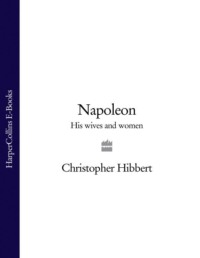
Napoleon: His Wives and Women
Napoleon expressed the opinion that looks in a wife did not matter. ‘It isn’t necessary that our wives should be good looking,’ he said. ‘With a mistress it is different. A plain mistress is a monstrosity. She would fail in her principal, indeed in her only duty.’
It had to be conceded that Julie was extremely unprepossessing in appearance; but she was both good-natured and intelligent.
Her sister was known in the family as Désirée but Napoleon, who was often in future to choose his own names for his women friends, called her Eugénie. She was rather fat and not particularly good-looking with large, slightly protuberant dark eyes; but she was an affectionate girl, kind-hearted like her sister, amenable and shy with a pleasant singing voice, the promise of a generous dowry, and what Napoleon described as ‘the most beautiful teeth imaginable’ as well as the ‘prettiest hands in the world’. A pretty hand and a pretty foot were always features upon which he was likely to comment. His own, so a future valet was to notice, were exceptionally well formed and his fingernails remarkably well cared for.
There could be no doubt that Désirée found him attractive; and he himself was sufficiently taken with her to carry about with him a few strands of her hair in a locket. Her father, however, was not inclined to encourage the friendship: the young Corsican might well have a bright future before him in the army; but he had little money and his character was not appealing. Introspective, unsociable and gloomy, he had been heard to speak of suicide.
Discouraged by her parents, Napoleon wrote to tell his dear Eugénie, after his departure from Marseilles, that, while her sweet nature inspired him with affection, he did not think that, being ‘so occupied with work’, he ought to allow that affection to ‘cut into [his] soul’. As for her, he went on to say, she had a talent for music: she should develop that talent, buy a piano of her own and engage a music teacher. Condescendingly he gave her peculiarly ill-informed advice about her singing technique.
In his next letter, not written until five months later, Napoleon returned to this musical theme: he would subscribe to a music magazine on her behalf and he sent her a list of books which he recommended that she should read. Four more months passed before Napoleon once again appeared in Marseilles and presented himself at the Clarys’ house.
Eugénie was now seventeen, less shy and reserved but as sweet-natured as ever. Before long, Napoleon fell in love with her; and now he made it clear that he would like to marry her and he evidently contrived to take her to bed. ‘You are always in my thoughts,’ he told her. ‘How can you think I could cease to love you?’ Mme Clary was deeply disturbed by this development: after all, her daughter was by now a most attractive girl with a dowry of one hundred thousand livres, whereas Napoleon was a gauche Corsican with no more to offer than his army pay. She already had one son-in-law who had no money of his own; and, for her, as she is supposed to have said, one Bonaparte in the family was quite enough.
Her mother’s reluctance to accept Napoleon into their family did not deter him in his pursuit of her. He wrote to her regularly after his return to Paris. He addressed her as his ‘adorable friend’; he was hers for life; he asked her to write to him at least once a day. Yet this ardour did not long survive his absence from her; soon he let days go by before bothering to go to the poste restante to fetch the letters, sad and expressive of longing and insecurity, which she wrote to him.
Away from Marseilles, he came across women from a different world. He met Victorine, comtesse de Chastenay, a clever young woman who was intrigued by the pallor of his gaunt cheeks, his long, unwashed hair, his extraordinary taciturnity. After dinner she sang a song in Italian and, when she had finished, she asked him if her pronunciation was correct. He answered her with the one word: ‘No.’ The next day he was more forthcoming, so much so, indeed, that they talked for four hours during which he elaborated his didactic views on all manner of subjects – from Shakespeare (whose plays were ‘pitiful’) and the poems of Ossian, exposed as forgeries by Samuel Johnson (and extravagantly admired by Napoleon), to the Parisiennes’ use of fans (which, so he said, betrayed their feelings as demonstrated by the actress Mlle Constant at the Com-édie Française).
Napoleon also met at this time another interesting young woman, Grace Dalrymple Elliott, a rich physician’s flighty divorced Scottish wife whose illegitimate daughter may have been the Prince of Wales’s, as she liked it to be supposed, though the child might equally well have been fathered by one of her other lovers. One day she and Napoleon went for a walk together in the Tuileries gardens. It was not a success: he spoke of his dislike and distrust of the English and his wish to see the earth open and swallow up the whole race. She said that it was not very tactful of him to say so in her presence. To this he replied that he had always supposed that the Scots loved France and disliked the English. She said that she herself preferred England to Scotland.
Конец ознакомительного фрагмента.
Текст предоставлен ООО «ЛитРес».
Прочитайте эту книгу целиком, купив полную легальную версию на ЛитРес.
Безопасно оплатить книгу можно банковской картой Visa, MasterCard, Maestro, со счета мобильного телефона, с платежного терминала, в салоне МТС или Связной, через PayPal, WebMoney, Яндекс.Деньги, QIWI Кошелек, бонусными картами или другим удобным Вам способом.
Вы ознакомились с фрагментом книги.
Для бесплатного чтения открыта только часть текста.
Приобретайте полный текст книги у нашего партнера:
Всего 10 форматов